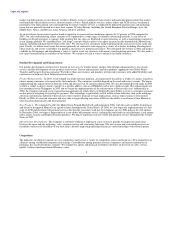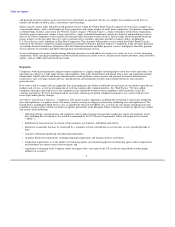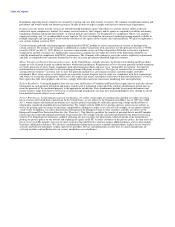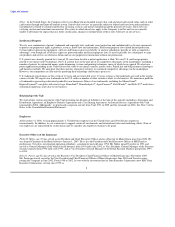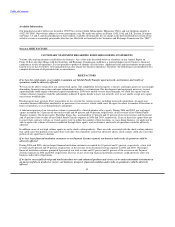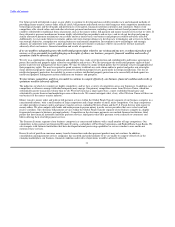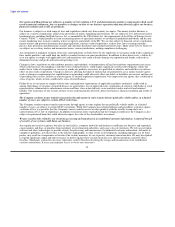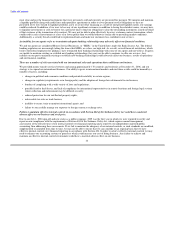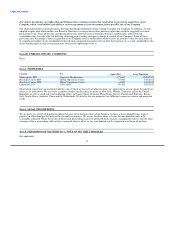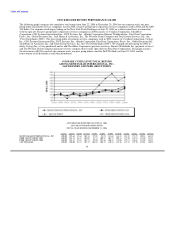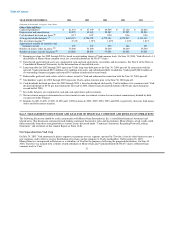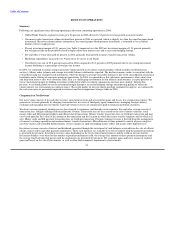MoneyGram 2006 Annual Report Download - page 18
Download and view the complete annual report
Please find page 18 of the 2006 MoneyGram annual report below. You can navigate through the pages in the report by either clicking on the pages listed below, or by using the keyword search tool below to find specific information within the annual report.
Table of Contents
Material changes in the market value of securities we hold, or in the securities as to which we act as an advisor, may materially affect
our results of operation and financial condition.
We also bear market risk that arises from fluctuations in interest rates that may result in changes in the values of our investments and
swap agreements. Rate movements can affect the repricing of assets and liabilities differently, as well as their market value. Stockholders'
equity can be adversely affected by changing interest rates, as after-tax changes in the fair value of securities classified as
available-for-sale and after-tax changes in the fair value of our swaps are reflected as increases and decreases to a component of
stockholders' equity. The fair value of our swaps generally increases when the market value of fixed rate, long-term debt investments
decline and vice versa. However, the changes in the fair value of swaps and investments may not fully offset, which could adversely
affect stockholders' equity.
The market values of securities we hold may decline due to a variety of factors, including decline in credit rating of the issuer or credit
issues related to underlying collateral of the security, general market conditions and increases in interest rates for comparable obligations.
If we determine that an unrealized loss on a security is "other-than-temporary," the loss becomes a realized loss through an impairment
charge in the income statement.
Our wholly owned subsidiary has entered into an agreement to act as collateral advisor for a pool of investment securities owned by a
third party. Deterioration in the value or performance of this investment pool, while not directly related to the company's own
performance, could adversely affect the business and prospects of the collateral advisor.
The opening of new retail locations and acquisition or start-up of businesses create risks and may affect our operating results.
We have recently opened several Company owned retail locations for the sale of our products and services. Operating such retail
locations presents new risks for us. After substantial capital investment in such retail locations it is uncertain how such locations will be
accepted in the market and how quickly transaction volume will increase to offset such investment. We may be subject to additional laws
and regulations which are triggered by our ownership of the retail locations and our employment of the individuals staffing such retail
locations. We also become subject to certain risks inherent in operating any retail location including theft, personal injury and property
damage, risks associated with long-term lease obligations and employee matters.
Additionally, we may from time to time acquire or start-up businesses both inside and outside of the U.S. The acquisition and integration
of businesses involve a number of risks. We may not be able to successfully integrate any businesses that we acquire, including their
facilities, personnel, financial systems, distribution, operations and general operating procedures. If we fail to successfully integrate
acquisitions, we could experience increased costs and other operating inefficiencies, which could have an adverse effect on our results of
operations.
The diversion of capital and management's attention from our core business that results from opening retail locations and/or acquiring or
starting-up new businesses could adversely affect our business, financial condition and results of operations.
A material slow down or complete disruption in international migration patterns could adversely affect our business, financial
condition and results of operations.
The money transfer business relies in part on migration patterns, as individuals move from their native country into countries with greater
economic opportunities and/or a more stable political environment. A significant portion of money transfer transactions are initiated by
immigrants or refugees sending money back to their native countries. Changes in immigration laws, economic development patterns that
discourage international migration and political or other events (such as war, terrorism or health emergencies) that would make it more
difficult for individuals to migrate or work abroad could adversely affect our money transfer remittance volume or growth rate and could
each have an adverse effect on our business, financial condition and results of operations.
Our business may require cash in amounts greater than the amount of available credit facilities and liquid assets that we have on
hand at a particular time, and if we were forced to ultimately liquidate assets or secure other financing as a result of unexpected
liquidity needs, our earnings could be reduced.
We are subject to risks relating to daily liquidity needs, as well as extraordinary events, such as the unexpected loss of a customer. On a
daily basis, we receive remittances from our agents and financial institution customers and we
15


